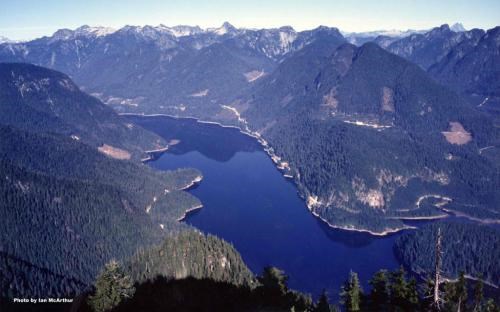Last summer's drought prompted regional watering restrictions that could be lengthened this summer under new Metro Vancouver regulations.
But one Port Moody councillor is taking issue with the language in the bylaw and suggesting more capacity is what's needed.
Coun. Rob Vagramov said referring to last year's water levels — which were below normal for the entire summer — as a water shortage is using "alarmist language," particularly since the shortage is actually in Metro Vancouver's capacity, he said, noting even with conservation measures in place, future population growth and climate change patterns will demand greater capacity within 50 years.
"We have plenty of lakes, we have enormous amounts of water in them, they're just not connected to the water system," Vagramov said, adding other parts of the world, such as California, would "laugh at what we call a water shortage."
"There is plenty of water in many sources, be it lakes or aquifers or potential rainwater collection. There will come a time when that language is correct… but who's going to believe it when we've talked about it like this for so long?"
(Drinking water is treated at the Seymour-Capilano Filtration Plant and the Coquitlam Water Treatment Plant, which have seen investments of about a billion dollars in the last decade.)
Metro Vancouver has charted storage levels at its Seymour, Capilano and Coquitlam reservoirs with the results posted online. While 2013 and 2014 storage levels were within the normal range, the early hot, dry weather that kicked off in June 2015 saw the storage levels drop off steeply to below the normal range by July and remain there until September.
Referring to the conditions as a water shortage is "absolutely not" alarmist, said Metro board chair and Port Coquitlam Mayor Greg Moore.
The decision to progress to a Stage 3 water restriction, which limits the use of treated drinking water outdoors to hand-sprinkling of flower and vegetable gardens and prohibits most other uses, isn't taken lightly, Moore added.
"We're looking at daily and hourly water consumption rates as well as resource levels, and we're working directly, daily, with Environment Canada forecasters to see if there's any meaningful precipitation in the future," Moore told The Tri-City News. "It was absolutely essential to go to Stage 3."
Metro Vancouver's capacity is sufficient to provide the region's 2.4 million residents with clean, treated drinking water over the next couple of decades "but we have to look beyond that," Moore said, noting in the next few years, Metro's utilities division will be investigating options for increasing reservoir capacity.
In the meantime, the region's staff are taking a close look at water consumption habits last year in the hopes of applying lessons learned to the upcoming season.
The move to Stage 1 and 2 restrictions caused no discernible drop in the daily consumption of treated drinking water, which was 1.8 billion litres per day. It wasn't until the need for Stage 3 restrictions became apparent and the regional authority began engaging with large-scale retail, commercial and industrial water users, as well as with the public, that usage levels dropped enough to avoid going to Stage 4.
"It's amazing how society came together and not once did we go above 1.2 billion litres a day," Moore said. "We need to learn why from Stage 2 to 3 everybody embraced it but Stage 1 to 2, nobody did."
Elaine Golds, a well-known environmentalist who pens The Tri-City News' Green Scene column, also emphasized the need to conserve over building greater capacity.
Enlarging existing reservoirs would mean losing parts of the surrounding forested watersheds, which could destabilize the banks and result in turbidity in what is now exceptionally clean drinking water, said Golds, who was on a regional water advisory committee for about a decade in the 1990s.
"We do have enough water, we just need to be careful about how we use it," she said.
Metro Vancouver municipalities will move to Stage 1 watering restrictions, with lawn sprinkling allowed three days a week in the early-morning hours only, regardless of weather conditions from May 15 to Oct. 15, an overall increase of four weeks over past years.



